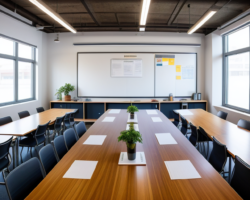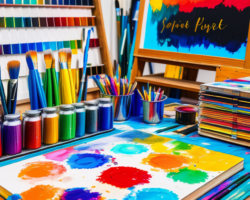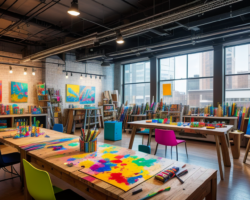Are you tired of the same old workshop formats that leave participants yawning and disengaged? Well, you’re in for a treat! This article dives into unconventional workshop ideas that can truly enhance learning and engagement. Imagine transforming a mundane session into an exhilarating experience where participants are not just passive listeners but active contributors. Sounds exciting, right?
In the world of workshops, the key to success lies in creativity and innovation. By exploring fresh perspectives that even seasoned facilitators might overlook, you can create an environment that fosters collaboration, creativity, and genuine learning. Think of your workshop as a canvas; the more vibrant the colours and strokes, the more engaging the masterpiece. Get ready to discover techniques that will not only captivate your audience but also leave a lasting impression!
From engaging icebreakers to hands-on activities, we will cover a range of ideas that can reinvigorate your approach. By the end of this article, you’ll be equipped with strategies that can turn any workshop into a memorable journey of discovery. So, buckle up and let’s unlock the secrets that experts don’t want you to know!
Engaging Icebreaker Activities
Starting your workshop with can truly set the stage for a collaborative and vibrant environment. Imagine walking into a room filled with strangers, and instead of the usual awkward silence, you’re greeted with laughter and lively discussions. Icebreakers are not just about breaking the ice; they’re about creating a warm atmosphere where participants feel comfortable and excited to share their thoughts. One effective icebreaker could be the “Two Truths and a Lie” game, where each participant shares two true statements and one falsehood about themselves. This not only sparks conversation but also encourages participants to learn interesting facts about each other.
Another fantastic approach is to incorporate creative storytelling. Ask participants to share a short story related to a theme of the workshop. This not only fosters connection but also stimulates creative thinking. You could even have a theme-based bingo where participants mark off squares as they learn new facts about their peers. The possibilities are endless!
To summarise, engaging icebreaker activities are essential for establishing a positive workshop atmosphere. They not only foster connections but also enhance creativity and collaboration. So, why not give these activities a try and watch your workshop transform into a dynamic learning experience?
Interactive Learning Techniques
When it comes to keeping participants engaged, are the secret sauce that can transform a mundane workshop into an exhilarating experience. Imagine walking into a room where every participant is buzzing with energy, not just sitting back and nodding off. This is the magic of making learning interactive! By incorporating methods that encourage active participation, you ensure that attendees are not merely passive listeners but enthusiastic contributors to the learning process.
One of the most effective ways to achieve this is through gamification. By introducing game-like elements into your workshops, you can create a fun yet competitive environment. For instance, consider implementing a point system where participants earn rewards for their contributions. This not only boosts motivation but also enhances retention of information. Just think of it as turning your workshop into a friendly competition where everyone leaves feeling accomplished!
Additionally, team challenges can work wonders. When participants work in groups to solve problems, they not only learn from the material but also from each other. This collaborative spirit can spark creativity and lead to innovative solutions that might not have emerged in a traditional setting. So, why not mix things up? Get your participants moving, thinking, and interacting, and watch as the atmosphere transforms into one of excitement and discovery.
Gamification Strategies
Gamification strategies are a fantastic way to transform the learning experience into something vibrant and engaging. By incorporating game-like elements into your workshops, you can create an atmosphere that not only motivates participants but also enhances their retention of information. Imagine a classroom where learning feels like an adventure rather than a chore! This approach can turn mundane topics into thrilling quests, making every participant an active player in their own educational journey.
One effective way to implement gamification is through a point system. Participants earn points for completing tasks, contributing to discussions, or collaborating with their peers. These points can lead to tangible rewards, creating a sense of competition and encouraging everyone to engage fully. For instance, you could set up a leaderboard that showcases the top performers, igniting a friendly rivalry that pushes participants to excel.
Another exciting strategy is to organise team challenges. By dividing participants into groups and presenting them with real-world problems to solve, you foster collaboration and critical thinking. Not only does this encourage teamwork, but it also allows participants to learn from each other’s strengths and perspectives. Imagine the thrill of racing against the clock to devise a solution, all while building camaraderie with your teammates!
Incorporating these gamification strategies can truly revolutionise your workshop, making learning a dynamic and enjoyable experience. So, why not take the leap and let your participants embark on an educational adventure that they won’t soon forget?
Point Systems and Rewards
Implementing point systems and rewards in your workshop can transform the learning environment into a vibrant and engaging space. Imagine walking into a room where every contribution, idea, and interaction is acknowledged and rewarded. This not only boosts motivation but also fosters a sense of healthy competition among participants. By establishing a clear point system, attendees can earn points for various activities such as answering questions, participating in discussions, or completing tasks.
For example, you might consider a structure like the following:
| Activity | Points Awarded |
|---|---|
| Answering Questions | 5 Points |
| Group Participation | 10 Points |
| Completing Tasks | 15 Points |
As participants accumulate points, they can unlock rewards such as certificates, small prizes, or even special privileges like leading a session. This not only encourages engagement but also enhances the overall learning experience. The thrill of competition can ignite passion and ingenuity, pushing attendees to think outside the box and collaborate more effectively. So, why not give it a try? Your workshop could become the talk of the town!
Team Challenges
Team challenges are not just about competition; they are a fantastic way to ignite collaboration and boost morale among participants. Imagine a room filled with individuals from diverse backgrounds, all working together to solve a complex problem. This dynamic creates an environment where creativity flourishes and relationships strengthen. By engaging in these challenges, participants learn to rely on one another’s strengths, fostering a sense of community that extends beyond the workshop.
Consider incorporating a variety of challenges that cater to different skills and interests. For instance:
- Problem-Solving Tasks: Present a scenario that requires a group to brainstorm solutions, encouraging critical thinking.
- Creative Building Challenges: Use materials like LEGO or craft supplies to build a model that represents a concept related to the workshop.
- Time-Bound Activities: Set a timer for participants to complete a task, injecting a sense of urgency that can lead to innovative solutions.
Moreover, the excitement of teamwork can lead to unexpected breakthroughs. Participants often find that the synergy of their combined efforts produces results that are greater than the sum of their parts. By fostering a competitive yet supportive atmosphere, team challenges can transform your workshop into a vibrant space of learning and growth.
Hands-On Activities
When it comes to workshops, are like the secret sauce that brings everything to life! Imagine diving into a world where theory meets practice, allowing participants to engage with the material in a way that’s both fun and memorable. These activities foster an environment where learning is not just a passive experience but an active adventure. For instance, instead of merely discussing a concept, why not let participants experiment with it? This could mean creating prototypes, conducting experiments, or even role-playing scenarios that mimic real-life challenges.
By incorporating hands-on activities, you enable participants to apply their knowledge immediately, which reinforces their understanding and retention of the material. Think of it as a cooking class where you don’t just watch the chef; you’re right there, chopping, stirring, and tasting! Here are a few examples of effective hands-on activities:
- Interactive Workshops: Participants can work in groups to solve a problem or create a project, encouraging teamwork and collaboration.
- Simulations: Create scenarios where participants can practice skills in a controlled environment, allowing for safe experimentation.
- Creative Arts: Use art supplies to express concepts visually, which can help in understanding abstract ideas.
In conclusion, hands-on activities transform workshops from mundane to extraordinary. They not only enhance learning but also build connections among participants, making the entire experience more enriching and enjoyable. So, why settle for a traditional approach when you can create an immersive learning experience that participants will rave about long after the workshop ends?
Utilising Technology in Workshops
In today’s fast-paced world, integrating technology into workshops is not just a trend; it’s a necessity. Imagine transforming a mundane session into an interactive experience that captivates and engages every participant. By leveraging digital tools and platforms, facilitators can create a dynamic learning environment where collaboration thrives.
One exciting avenue to explore is the use of virtual reality (VR). This technology immerses participants in simulations, allowing them to experience scenarios that are often challenging to replicate in a traditional setting. For instance, a workshop on conflict resolution might use VR to place individuals in a simulated negotiation, offering them invaluable insights and perspectives.
Additionally, online collaboration tools such as Google Workspace or Trello can enhance teamwork, enabling participants to brainstorm and share ideas seamlessly. These platforms break down geographical barriers, ensuring that everyone can contribute, regardless of their location. Imagine a workshop where ideas flow freely, and creativity sparks from every corner of the room!
Ultimately, by embracing technology, facilitators can not only enhance learning experiences but also foster a culture of innovation and engagement that resonates long after the workshop concludes.
Virtual Reality Experiences
Imagine stepping into a world where the boundaries of reality blur, and learning becomes an exhilarating adventure. Virtual reality (VR) experiences can transform your workshop into an immersive journey, captivating participants like never before. By integrating VR, you’re not just teaching; you’re transporting attendees into scenarios that they can interact with, fostering a deeper understanding of complex concepts.
For instance, in a workshop on environmental sustainability, participants could don VR headsets and explore a virtual rainforest, witnessing the impact of deforestation firsthand. This kind of engagement not only grabs attention but also creates lasting impressions that traditional methods simply cannot achieve.
Moreover, VR experiences can be tailored to suit various learning objectives. Whether it’s simulating a challenging business negotiation or exploring historical events, the possibilities are endless. Here are some key benefits of using VR in your workshops:
- Enhanced Engagement: Participants are more likely to stay focused and involved when they can interact with the material in a dynamic way.
- Safe Learning Environment: VR allows for experimentation without real-world consequences, encouraging risk-taking and innovation.
- Multi-Sensory Learning: Engaging multiple senses can improve retention and understanding of complex topics.
Incorporating VR not only makes learning fun but also prepares participants for real-world challenges by offering them a unique perspective. So, why not elevate your next workshop with the magic of virtual reality?
Online Collaboration Tools
In today’s fast-paced world, have become indispensable for enhancing teamwork and communication during workshops. These digital platforms not only streamline the sharing of ideas but also foster a sense of community among participants, regardless of their physical locations. Imagine being able to brainstorm in real-time with colleagues from across the globe, all while sipping your morning coffee!
Tools like Google Workspace, Trello, and Slack have revolutionised the way we collaborate. With Google Workspace, you can create and edit documents simultaneously, making it easy to gather feedback instantly. Trello, on the other hand, allows teams to visually manage tasks and projects, ensuring everyone stays on the same page. Meanwhile, Slack facilitates seamless communication through channels and direct messaging, enabling quick discussions and updates.
Consider the benefits of using these tools:
- Real-time Collaboration: Work together instantly, regardless of where you are.
- Enhanced Organisation: Keep tasks and discussions organised for better productivity.
- Increased Engagement: Foster a more interactive and participatory workshop environment.
By leveraging these online collaboration tools, facilitators can create an engaging atmosphere that promotes active participation, ensuring that every voice is heard and valued. So, why not embrace these technologies and transform your workshops into dynamic learning experiences?
Creative Problem-Solving Techniques
When it comes to tackling challenges, embracing can be a game changer. These methods not only inspire innovative thinking but also encourage participants to view problems from different angles. Imagine being in a room where everyone is buzzing with ideas, each person bringing their unique perspective to the table. Sounds exciting, right? Well, that’s the magic of creativity in problem-solving!
One effective technique is mind mapping, which allows participants to visually organise their thoughts. By creating a mind map, individuals can see connections between ideas, facilitating clearer communication and sparking new concepts. It’s like turning a tangled ball of yarn into a beautifully organised tapestry of thoughts!
Another engaging method is role-playing scenarios. This technique allows participants to step into someone else’s shoes, fostering empathy and understanding. By acting out different perspectives, they can collaboratively tackle real-world challenges, making the learning experience not just informative but also deeply enriching. It’s akin to rehearsing for a play; the more you immerse yourself in the character, the more you understand the story!
Utilising these can transform your workshops into dynamic environments where learning flourishes. So, why not give them a try? You might just unlock a treasure trove of ideas!
Mind Mapping Exercises
Mind mapping exercises are a fantastic way to unleash creativity and enhance understanding during workshops. Imagine your thoughts as branches of a tree, each representing a different idea or concept. This visual representation not only makes complex information more digestible but also stimulates **creative thinking**. By organising thoughts in a structured yet flexible manner, participants can see connections they might otherwise miss.
During a workshop, you could start with a central theme and encourage attendees to contribute their ideas, which can be added as branches. This collaborative effort not only fosters a sense of community but also allows for a rich tapestry of ideas to emerge. For instance, if the topic is ‘Sustainable Living’, participants might branch out into areas like energy conservation, waste reduction, and eco-friendly products. Each sub-topic can further expand into specific actions or challenges.
To facilitate this, consider providing participants with tools such as coloured markers and large sheets of paper, or even digital mind mapping software for those who prefer a tech-savvy approach. The visual aspect of mind mapping can significantly enhance memory retention and understanding, making it an invaluable exercise in any learning environment.
In conclusion, by incorporating mind mapping exercises into your workshops, you not only make learning engaging but also empower participants to think critically and creatively. This method transforms abstract concepts into tangible ideas, paving the way for innovative solutions and deeper insights.
Role-Playing Scenarios
Role-playing scenarios are an incredibly effective way to engage participants in a workshop. They allow individuals to step into different shoes, exploring various perspectives and approaches to problem-solving. Imagine being in a room where everyone is not just a passive observer but an active contributor to the learning experience. By simulating real-world situations, participants can practice their responses and strategies in a safe environment, which can lead to profound insights and personal growth.
Moreover, these scenarios can be tailored to fit the specific goals of the workshop. For instance, if the focus is on conflict resolution, participants can role-play as opposing parties in a negotiation, allowing them to experience the nuances of communication and empathy. This hands-on approach not only makes learning more memorable but also enhances participants’ ability to apply these skills in their daily lives.
To make the most out of role-playing, consider the following key elements:
- Clear Objectives: Define what you want participants to learn from the scenario.
- Realistic Context: Create a relatable situation that resonates with the participants.
- Debriefing Sessions: Follow up with discussions to reflect on the experiences and lessons learned.
Incorporating role-playing into your workshops not only fosters a culture of empathy and collaboration but also equips participants with practical skills that they can utilise long after the workshop ends.
Feedback and Reflection Methods
Feedback and reflection are the cornerstones of any successful workshop, allowing participants to digest what they’ve learned and apply it in real-life scenarios. By incorporating effective feedback methods, you can create a culture of openness and growth. Imagine a space where every voice is heard, and constructive criticism is not just welcomed but encouraged. This transforms the learning environment into a collaborative haven where ideas flourish.
One innovative approach is to organise peer review sessions. This method not only gives participants the chance to share their insights but also fosters a sense of community. Participants can engage in meaningful discussions, providing and receiving feedback that is often more relatable than instructor-led critiques. This peer-to-peer interaction can lead to deeper understanding and stronger connections among attendees.
Additionally, encouraging the use of reflection journals can be a game changer. These journals allow participants to jot down their thoughts, feelings, and key takeaways from the workshop. Over time, these reflections can reveal patterns in learning and personal growth, providing valuable insights that can be applied far beyond the workshop’s end. In essence, these methods not only enhance learning but also empower participants to take ownership of their educational journeys.
Peer Review Sessions
Peer review sessions are an invaluable tool for fostering a collaborative and supportive learning environment. Imagine a space where participants can openly share their work, receive constructive feedback, and grow together. This process not only enhances individual skills but also builds a sense of community among attendees. During these sessions, participants can engage in meaningful discussions, allowing them to see their work from different perspectives. Isn’t it fascinating how a fresh pair of eyes can unveil insights that we might overlook?
To make the most of peer review sessions, consider implementing the following strategies:
- Set Clear Guidelines: Establish rules for providing feedback to ensure it is constructive and respectful.
- Encourage Active Participation: Prompt participants to ask questions and engage in discussions about each other’s work.
- Rotate Pairs: Change the pairing of participants regularly to expose them to diverse viewpoints.
Furthermore, integrating a feedback form can streamline the process, allowing participants to reflect on the critiques received. This not only promotes self-awareness but also encourages continuous improvement. By nurturing a culture of constructive feedback, peer review sessions can transform the learning experience, making it more enriching and impactful. After all, learning is a journey best travelled together!
Reflection Journals
Reflection journals are a powerful tool that can transform the way participants engage with their learning experiences. By encouraging individuals to document their thoughts, feelings, and insights, these journals create a personal space for introspection. Imagine having a canvas where you can paint your learning journey, capturing not just what you’ve learned, but how it resonates with you on a deeper level.
Utilising reflection journals can lead to several benefits, including:
- Enhanced Self-Awareness: Participants gain a clearer understanding of their strengths and areas for improvement.
- Deeper Learning: Writing about experiences helps consolidate knowledge, making it more likely to stick.
- Personal Growth: Reflection encourages individuals to think critically about their actions and decisions.
To implement reflection journals effectively, consider these strategies:
- Prompt Questions: Provide specific prompts to guide reflections, such as “What was the most surprising thing I learned today?” or “How can I apply this knowledge in my daily life?”
- Regular Check-Ins: Encourage participants to set aside time during or after the workshop to write in their journals, fostering a habit of reflection.
In conclusion, reflection journals not only enrich the learning experience but also empower participants to take ownership of their development. By integrating this practice into workshops, facilitators can cultivate a culture of continuous improvement and self-discovery, ensuring that the learning journey extends far beyond the confines of the session.
Frequently Asked Questions
- What are some unique icebreaker activities I can use?
Consider activities like “Two Truths and a Lie” or “Speed Networking” where participants share quick facts about themselves. These not only lighten the mood but also spark conversations that can lead to deeper connections.
- How can I make my workshop more interactive?
Incorporate techniques such as live polls, breakout discussions, or hands-on tasks. This keeps participants engaged and ensures they are actively contributing rather than just listening.
- What is gamification and how can I implement it?
Gamification involves adding game-like elements to your workshop. You can introduce point systems, badges, or even friendly competitions to motivate attendees and make learning fun!
- How can technology enhance my workshop?
Utilising tools like virtual reality or online collaboration platforms can create immersive experiences and facilitate teamwork, making learning more dynamic and effective.
- What methods can I use for feedback and reflection?
Encourage participants to engage in peer review sessions and maintain reflection journals. This promotes a culture of constructive feedback and self-improvement that extends beyond the workshop.





